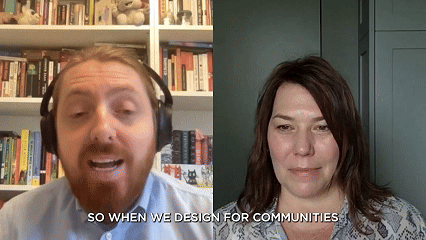Conversation on Community-Led Healthcare
We recently had the opportunity to sit down with Lorie Spence, co-founder of CONNECT, for their Collaborator Interview Series, a platform designed to encourage collaboration in the healthcare industry. In this conversation, we shared our approach to patient-led healthcare innovation, how we identify challenges, and the impact of our work on communities in West Toronto.
We Put our Communities First
When asked what sets the West Toronto Ontario Health Team (OHT) apart, we spoke about our commitment to putting patients, families, and caregivers at the center of healthcare system design.
A great example of this is our Climate & Health Hackathon, hosted in partnership with Humber College’s Office of Sustainability. We brought together 50+ community members to explore how climate resilience affects human health. The ideas that emerged from this event are being implemented by the very people who developed them.
Another example is our iHelp Centres, made possible through partnership with Toronto Community Housing and other organizations. Based on a support in-housing model , we’ve co-designed services directly within TCH buildings to ensure that tenants are actively involved in shaping what services are available, how they’re delivered, and even how the space itself feels. This has made a tangible difference in building trust, accessibility, and meaningful community engagement.
We Use Problem-First Thinking
Laurie also asked us about our how our team approaches creating healthcare solutions, we highlighted the importance of listening to lived experiences and how that helps challenge our own data-based assumptions on what the community needs.
Rather than starting with funding and figuring out how to spend it, we begin with a simple question: What matters most to the community? What are their most pressing needs? Through continuous meaningful engagement with residents and community members in priority neighbourhoods, we identify critical gaps in primary care and social services. We start with falling in love with the problem, the real stories of real people impacted by those problems and work to build solutions that address them.
The iHelp Centres are a direct result of this approach. Located in Toronto Community Housing buildings, these centres bring access to healthcare and social services directly to where people live. The impact was immediate. On day one, a tenant walked in and said,
“I volunteer here now.”
Since then, residents have shaped everything from murals on the walls to the services we offer, creating an inclusive space that feels like home. By ensuring the community leads every step, we’ve built trusted, welcoming environments that break down barriers to care.
Empowering Communities for the Future
What do we most looking forward to in the future around person-centered care model?
People supporting one another. We believe that healthcare goes beyond services, on a day-to-day level, it’s about creating a culture of care and support in our communities. We’re exploring how to implement community-driven support models, such as volunteer registries that check in on neighbors during extreme weather, inspired by international programs.
Our work with climate resilience kits were designed with input from a local family and the tools they use to keep the temperature in their house down during heat waves without access to air conditioning. We distributed 150+ kits and this goes to show how community-led solutions can make a real impact.
A huge thank you to Lorie Spence and the Connect team for giving us the space to share our work. Here’s to moving healthcare forward through collaboration, adaptability, and a passion for patient care. To view the full conversation, watch the CONNECT Collaborator Series to see how other healthcare organizations are innovating patient-centered care.


